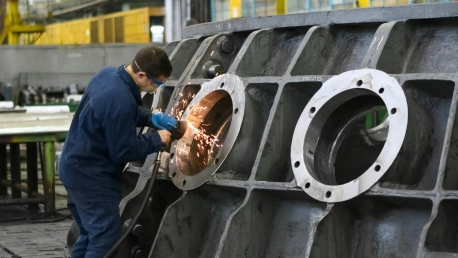The UK manufacturing sector is experiencing a promising turnaround in its longstanding recruitment challenge, as evidenced by the latest Make UK’s Q2 HR Bulletin. The industry, which has been battling a deep-rooted skills shortage, is now witnessing a surge in successful job placements. In stark contrast to previous figures, where less than half of firms saw an uptick in hires, an impressive two-thirds of companies are now reporting a rise in filled positions. This significant improvement signifies a hopeful shift for the sector’s employment climate, offering a ray of hope for its future growth and stability. With two-thirds of manufacturing companies now reporting increases in filled positions, up from a mere 43% in the previous quarter, the industry can breathe a sigh of relief and look forward to a more robust workforce to underpin its operations.
Recruitment Advancement
Job Placement Success
The British manufacturing sector is experiencing a boon in recruitment success, largely due to strategic initiatives taken by companies. A key factor has been the emphasis on staff retention, which has effectively conserved valued experience within the industry. This retention is crucial as it serves as a bulwark against the detrimental skills shortage traditionally faced by the sector. Moreover, the reintegration of seasoned workers into the workforce has been instrumental in enhancing the available expertise and reducing turnover rates. These older professionals bring a wealth of knowledge and stability, further solidifying the sector’s progress. Collectively, these efforts have infused the manufacturing industry with renewed vigor, as it successfully tackles the challenge of unfilled positions and forges ahead with a more robust and skilled workforce.
Influencing Factors
In the manufacturing recruitment space, a dynamic strategy has been key to recent improvements. A mix of elements has come together to mitigate the challenge of sourcing qualified workers. Notably, a reduction in sick days has led to more consistent staffing levels, reducing the urgent need for recruitment. Compensation expectations have adjusted, as many companies adopt the national living wage, making salary structures more homogeneous. Moreover, the introduction of flexible work policies has revolutionized work-life balance, beneficially influencing employee loyalty. These measures are demonstrating their worth by not only attracting but also keeping in-house talent. With such developments, the sector is witnessing a positive shift in stabilizing its workforce, ensuring that recruitment and retention are more manageable.
Persisting Challenges
Skills Gap Predicament
While recruitment figures show promise, a stark skills gap casts a long shadow over the industry. A substantial 65% of companies report difficulties in finding candidates with the necessary technical skills. The demand for such talent is more pressing than ever, highlighting the significant journey that remains to bridge this divide. The misalignment between the existing workforce and the specialized skill sets required by today’s advanced manufacturing sector is a major hurdle, impacting the growth potential within the industry. Addressing this mismatch is critical for both current needs and future prosperity. The resolution lies in aligning educational outcomes with industry needs, investing in vocational training, and fostering a culture of continual skill development. Only then can the industry expect to close the gap and fully harness its growth capabilities.
Workforce Qualification Hurdles
Almost a third of manufacturing companies are struggling to find adequately skilled candidates, indicating a significant gap in the labor market’s skill level. The situation underlines an urgent need for the government to thoroughly reassess and revamp the apprenticeship system. Industry voices are advocating a return to the higher levels of manufacturing apprenticeships that existed prior to the introduction of the levy system, looking to resolve ongoing hiring challenges and secure a constant stream of talent into the sector. This restoration is essential to address the vacancy issue and to bolster the workforce with individuals who possess the necessary expertise. The call for action is clear: to maintain a robust manufacturing industry, the apprenticeship pathway must be reinforced and expanded.









